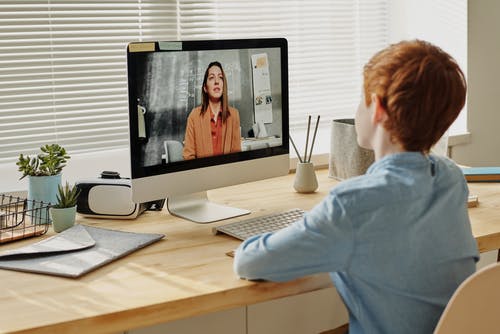HOW TO KEEP CHILDREN SAFE ON THE INTERNET

The internet can be a great place for kids and teenagers to learn, socialize, and have fun. It's a normal part of growing up. In fact, the internet is used by almost one billion children and teenagers. Every day, 170,000 children access the internet for the first time. However, the internet was not created with children in mind, and there are some important precautions to take to keep kids safe online.
Tips to Help Protect Children
- Priorities safety: We at Mayoor School, which is the best CBSE School in Noida teach the kids not to share personal information. This includes information such as their name, address, and phone number. Other aspects of their lives may reveal more information than they realize. Children should not reveal which school they attend or upload photos of themselves in uniform.
- Set parental controls: As one of the top 10 schools in Noida, we inform the parents to create a list of websites that their child can access. The majority of social media platforms have a 13-year-old age limit. Mayoor School, being the best school in NCR, educates the children to use these platforms judiciously.
- Discuss their activity: As a CBSE School in Noida, parents are made aware of certain things like to take an interest in what they're up to on the internet. Discuss their favourite websites, videos, and online buddies with them. This will keep the lines of communication between parent and child open.
- Set boundaries: As one of the best CBSE affiliated school in Noida,we always educate our children to set time limitations for things accessing the internet and playing video games and time for family activities that aren't connected to the internet.
- Be open: Make the child aware that they can inform you about anything that occurs on the internet. Try to listen without passing judgment or becoming enraged. Explain your concerns to older children so they understand the reasons behind any rules you establish. Our school being the best school in Noida, suggests to keep an eye on your child's online habits and if they are being bullied online. You can always try something new and make some guidelines about how, when, and where devices are allowed to be used.
According to a recent poll by International CBSE schools express way, more than 83 percent of teenagers who have access to the internet go online three or more times everyday during the coronavirus disease. It's past time for you, as parents, to update your parenting toolkit with some cyber-handling advice.
FAQs
Q1. How can I keep my child safe on social media?
Establishing age-appropriate boundaries, emphasising privacy awareness, and fostering open communication are all essential to protecting your child on social media. Use parental controls to monitor what your children do online, emphasise posting responsibly, and have discussions about cyberbullying. Make social media connections with your kids to help them build secure online interactions with people they know. Keep up with technological advancements while imparting the values of responsible digital citizenship. With the help of this all-encompassing strategy, your child can browse social media responsibly and enjoy a safe online environment. As your child grows older and technology advances, revisit these guidelines frequently and make adjustments.
Q2. How can we protect children from Internet abuse?
Parents, teachers, and other caretakers must present a unified front in order to protect children against online abuse. Fostering open communication, educating people about risks, and creating clear standards are fundamental to internet safety. It is essential to implement parental restrictions, monitor online activity on a regular basis, and teach responsible online behaviour. It is essential to support a healthy screen time strategy and encourage reporting. Crucial elements include setting an example of appropriate online behaviour, keeping up with technological advancements, and raising awareness of cybersecurity. Using safe search engines helps shield kids from unsuitable content and provide a safe online environment. Maintaining effective and plagiarism-free protection requires constant communication and flexibility in response to emerging technology.
Q3. How do I keep my 12 year old safe online?
A complete plan is necessary to ensure your 12-year-old's internet safety. Make clear regulations, education about internet threats, and open communication your top priorities. Put in place parental restrictions, keep a close eye on what kids do online, and teach them to behave responsibly. Encourage healthy screen-time behaviours, set an example of responsible online behaviour, and keep up with emerging digital trends. Help your kids set up their privacy settings, encourage digital literacy, and place a strong emphasis on cybersecurity knowledge. Promote the use of secure search engines as a way to reduce exposure to offensive material. Continually reevaluate and modify these steps to correspond with your child's development and the ever-changing technological environment, guaranteeing an original and efficient method.
Q4. How do I make my child's browsing safe?
Keeping an eye on your child's internet use requires a thorough plan. To ensure that content is age-appropriate, use parental controls, safe search settings, and kid-friendly browsers. Encourage the use of instructional websites and set sensible screen time restrictions. Encourage candid conversations about online safety, set clear guidelines, and keep a close eye on browsing activities. Make password security a top priority, keep your security software up to date, and promote critical thinking. Keep an eye on social media activity, roll out safe content channels, and stay in touch to resolve issues. By taking these precautions, a safe online environment is created, encouraging responsible digital habits that are adapted to your child's changing requirements and guaranteeing an approach free of plagiarism.
-01_002.png)




